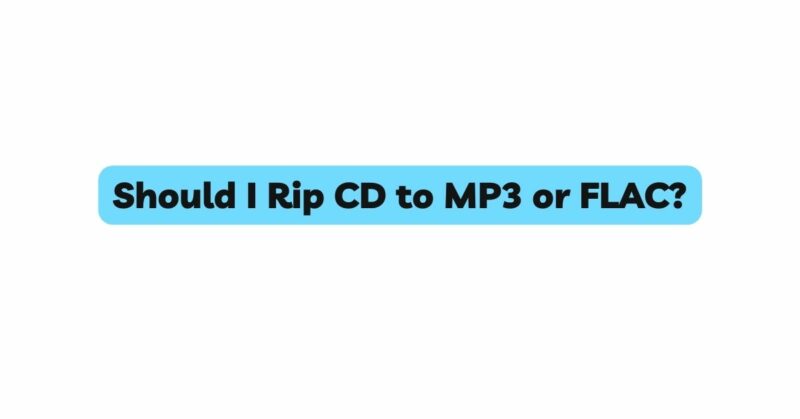In the age of digital music, the choice of file format for CD ripping holds significant implications for audio quality and storage efficiency. Among the myriad options, two formats stand out: MP3 and FLAC. The decision to rip a CD to MP3 or FLAC is a crucial one that balances audio fidelity with storage considerations. This article delves into the features, advantages, and trade-offs of both formats, equipping you with the knowledge to make an informed choice that aligns with your music preferences and practical needs.
Understanding MP3: MP3 (MPEG Audio Layer III) is a widely adopted audio compression format that revolutionized digital music consumption. It employs lossy compression, which means that it reduces file sizes by discarding some audio data that the human ear is less sensitive to. While this approach results in smaller files, it can also impact audio fidelity to varying degrees.
Pros of Ripping to MP3:
- Space-Efficient: MP3 files are significantly smaller than their uncompressed counterparts, making them an excellent choice for conserving storage space on devices and cloud platforms.
- Wide Compatibility: MP3 is one of the most universally supported audio formats, ensuring that your ripped files can be played on a wide range of devices and software.
- Ease of Sharing: Smaller file sizes make MP3s easy to share and distribute, making them suitable for creating playlists or sharing your music with others.
Cons of Ripping to MP3:
- Loss of Audio Fidelity: Due to lossy compression, MP3 files sacrifice some audio detail to achieve smaller sizes. This loss can be more noticeable when using lower bit rates.
- Variable Quality: The audio quality of an MP3 file depends on the chosen bit rate. Higher bit rates offer better quality but result in larger files.
Understanding FLAC: FLAC (Free Lossless Audio Codec) is a lossless audio compression format designed to preserve audio fidelity while reducing file sizes. Unlike MP3, FLAC retains all the original audio data, ensuring an accurate representation of the CD’s sound.
Pros of Ripping to FLAC:
- Preservation of Audio Quality: FLAC’s lossless compression ensures that the audio fidelity of the ripped files closely matches the original CD’s sound. There is no loss of audio data.
- Perfect Archiving: FLAC is an excellent choice for archiving your music collection in digital format. The files retain the highest audio quality without taking up excessive storage space.
- Future-Proofing: As technology evolves, FLAC remains a versatile format. It allows for easy transcoding into other formats without further degradation of quality.
Cons of Ripping to FLAC:
- Larger File Sizes: FLAC files are larger than their MP3 counterparts due to the preservation of audio data. This might lead to increased storage demands, especially for extensive music libraries.
- Limited Compatibility: While FLAC has gained broader support over the years, it might not be as universally compatible as MP3, particularly on older devices and software.
Choosing Between MP3 and FLAC: The choice between ripping to MP3 or FLAC hinges on your priorities and circumstances:
Rip to MP3 If:
- Storage space is a significant concern, and you want to maximize the number of tracks you can store.
- You primarily listen to music on devices with limited storage, such as smartphones or portable music players.
- You value ease of sharing and compatibility across various devices and platforms.
Rip to FLAC If:
- Audio quality is paramount, and you want to ensure that your digital copies closely match the original CD’s sound.
- You have ample storage space and prioritize preserving the highest audio fidelity.
- You plan to create a high-quality digital archive that can withstand changes in technology.
Consider Hybrid Approaches: You can also consider a hybrid approach by ripping some CDs to MP3 for casual listening and FLAC for cherished albums or tracks that demand the utmost audio quality.
Conclusion: The Art of Balance: The choice to rip a CD to MP3 or FLAC is ultimately a matter of balancing audio quality, storage considerations, and practicality. MP3’s space efficiency and wide compatibility make it an excellent choice for on-the-go listening and sharing, while FLAC’s commitment to audio fidelity and archiving suitability makes it a top pick for audiophiles and preservationists. By understanding the features and trade-offs of each format, you can tailor your CD ripping approach to align with your musical preferences and technological requirements, ensuring that your digital music collection reflects the best of both worlds.


